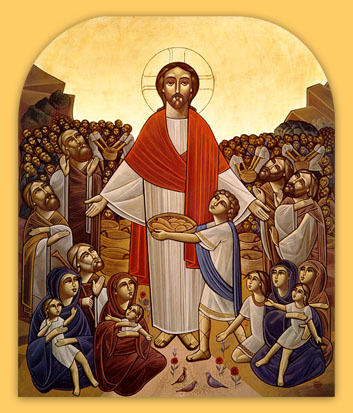Received To Pulse With Jesus
17th Sunday of the Year B (29Jul 2012)
Homily of Fr. Paul Panaretos, S.J.
How many gospels does the New Testament contain? Yes, four. And, you know their names are. . . . Yes, Matthew, Mark, Luke and John.
As you know, Mark’s gospel, from which we hear on Sundays this year, is the shortest of the four. You also recall the Second Vatican Council desired us Catholics to hear more scripture during Sunday Masses and did so by recalling tradition and exercising creativity. The gospel of John was and continues to be the gospel of Lent and Easter. In tandem with Tradition the Council revised the lectionary so we could hear more scripture. It did by devoting a year of continuous reading at mass of Matthew, Mark and Luke. So what gives today? Why in this year of Mark is today’s gospel reading from John? The short answer is because Mark’s is the shortest gospel.
The gospels of Matthew and Luke each can cover a liturgical year assisted by John’s gospel during the Lenten and Easter seasons. Because Mark’s gospel is shorter, we would finish it over a month before Advent would begin a new liturgical year—even with John’s gospel used during Lent and Easter! To remedy a too early ending of the gospel during each Year of Mark the Second Vatican Council revised the lectionary so that we hear the sixth chapter of John’s gospel for five Sundays. That explains the shift to John. What ought we look for in the coming weeks?
Through the modern era many have spilled much ink about John’s gospel and about its sixth chapter in particular. Pioneering and not-able scholars put forward opposing views, at time inferring things the text does not support.
One of my teachers regularly reminded his students, “Stick close to the text.” By reading what’s there instead of getting carried away with strange ideas, one avoids inferring what the text cannot or does not mean. That teacher taught my other teacher, who believes we profit most by the process of reading any scripture, which he overemphasized with a memorable statement: “When I am invited to preach on a scripture text, I have an urge to lock myself in a hotel room for a weekend and read the entire bible.” Overemphasis, yes, but Luke made his point: God’s revelation clothed in human language is one, grand chronicle of God entering human history.
Reading what’s there, as we begin our weeks with Jesus identifying himself as the Bread of Life, I take my cue from a word in the first reading from Second Kings: firstfruits; and from its psalm, The hand of the Lord feeds us.
The Creator, Blessed be God, provides all our needs by giving us the natural world. God feeds us through the earth. With Firstfruits, the earliest ripe portion of the crop or newborn livestock, people honored God. When money replaced bartering crops or animals for daily goods, people gave first a portion of their income to charity and to their places of worship: hence, tithing and others forms of stewardship we know.
Our triune God also gives in another, uniquely relational way. God not only became human for us. Our God honored us, giving us Jesus as divine firstfruits, the firstborn, only Son of God. And more: Jesus gives us himself, his body and his blood, to nourish us on our faith journeys, our pilgrim way on earth.1 Jesus feeds us with bounty to spare, though his body and blood as we consume them, a bit of bread and a sip of wine, do not satisfy our human appetites.
We receive the Lord Jesus’ whole being each time we ingest a consecrated morsel of bread and a sip of consecrated wine. Noticing Jesus’ fondness for fully entering our human ways focuses us on eating and drinking. When we ingest any food we digest it: our bodies absorb food’s nutrients so they merge with us: fueling, shaping, strengthening and fortify-ing us until our next meal. Jesus gives us himself so that his Real Presence nourishes us really to be his presence in our world.
In your daily 15 minutes with Jesus this week
- Pause, recall and relish your communion in with the Trinity.
- Ask Phillip and Andrew to present you to Jesus.
- Leisurely entertain what Messiah Jesus moves you to notice: his presence; his affection; his direction; his counsel and the like.
- Aware that each of your cells and inmost self pulse with Jesus, ask him to give you the grace to live in a manner worthy of the [the One] you have received, with all humility and gentleness, with patience, bearing with one another through love.
- Close saying slowly the Lord’s Prayer. Jesus’ words teach us how to make the pattern of Jesus’ life our pattern of living. Our scarred and riven world needs us to live his way each day.
Link to this homily’s Spiritual Exercise
____________
1. Cf. Decree on Ecumenism, 2-3, the Second Vatican Council. Our pilgrimage is no lost wandering because the “Church. . .is like a standard lifted high for the nations to see it: for it serves all mankind through the Gospel of peace” (2).
___________________________________________________________________________________
Wiki-image of thank offerings to the Lord is in the public domain in the U.S. Wiki-image of Jesus feeding the multitude is in the public domain.


No comments:
Post a Comment